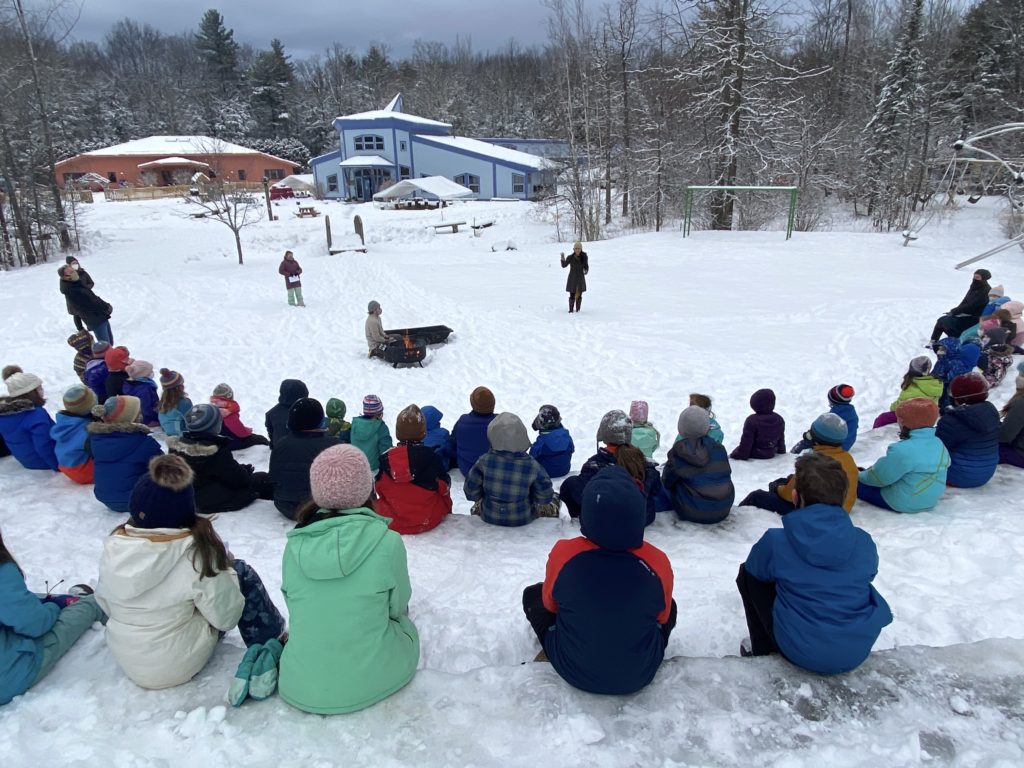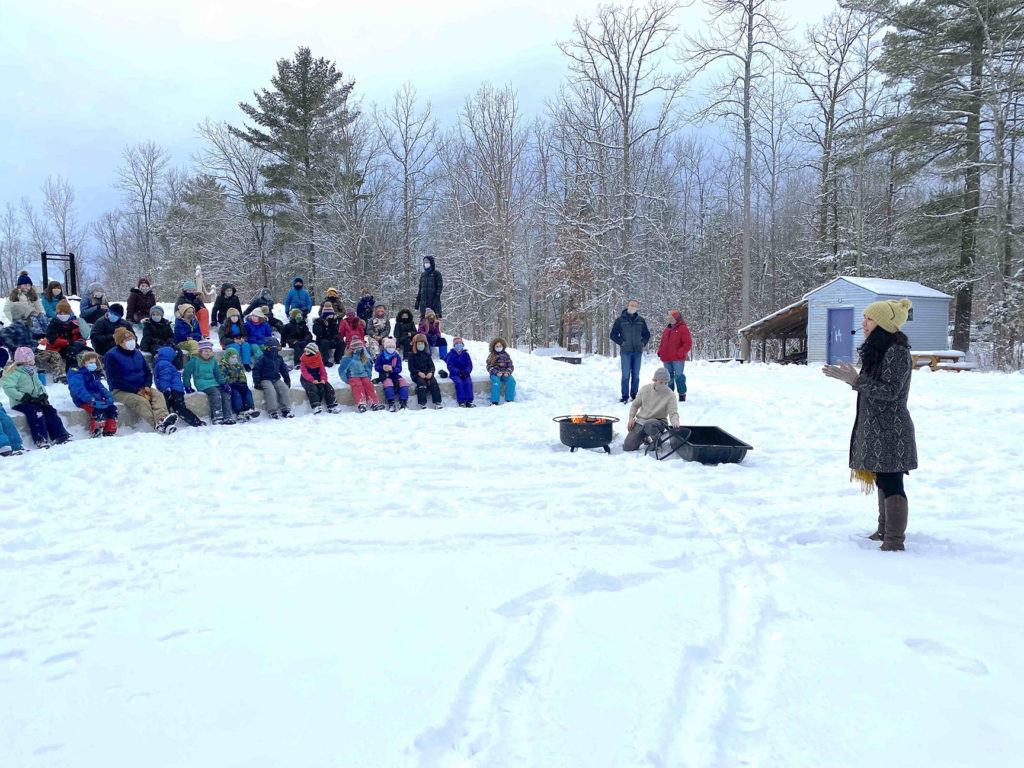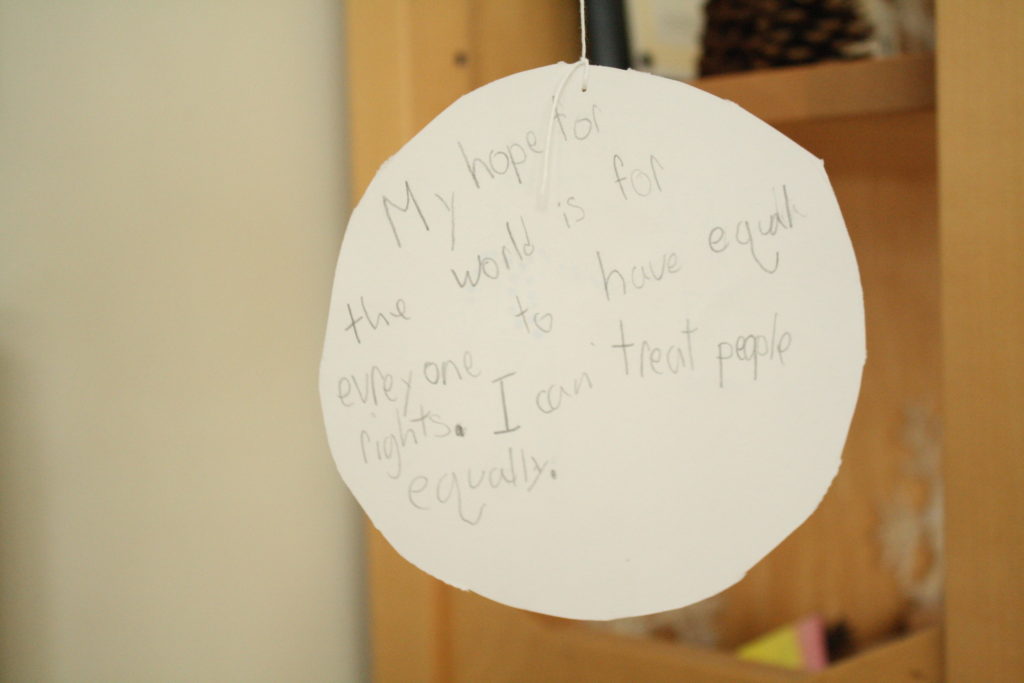
 On Martin Luther King Day, our students joined in a day ON of learning and service in honor of Dr. King. The day started with a keynote address by Senator Kesha Ram, the first person of color elected to the Vermont Senate, to the student body. In 27 degree weather, Senator Ram spoke in the school’s snowy amphitheater about her life story, Vermont’s history and present work in racial justice, and an image that inspires her work.
On Martin Luther King Day, our students joined in a day ON of learning and service in honor of Dr. King. The day started with a keynote address by Senator Kesha Ram, the first person of color elected to the Vermont Senate, to the student body. In 27 degree weather, Senator Ram spoke in the school’s snowy amphitheater about her life story, Vermont’s history and present work in racial justice, and an image that inspires her work.
Senator Ram was introduced by senior Sofia Anderson Harrington:
I am here today to introduce my good friend and Vermont State Senator Kesha Ram. Senator Ram has accomplished many “firsts.” Not only is she the first woman of color in the state senate, she was the first woman of color to be the student body president at UVM, and she was the youngest state legislator in the country when she got elected to the Vermont House of Representatives in 2009. While in the House of Representatives, she led efforts to help mak
e sure undocumented immigrants had the ability to drive legally, to have Abanaki Tribes recongnized, and to criminalize revenge porn. She was awarded the Truman scholarship for public service leadership and academic excellence and went on to get her graduate degree from Harvard in 2018. Through my time here at the Waldorf High School, we have been talking about racial justice and equality. These are two things that Senator Ram finds really important, and she is a big advocate for people of color and immigrants in Vermont. I hope that since a lot of us are politically involved with big issues around race and justice, you can learn about more ways to be involved. Please welcome my good friend Vermont Senator Kesha Ram.
Senator Ram described the great Sequoia trees, the largest living things on land, whose roots are quite shallow. The roots, she explained, reach out for and support one another so a whole grove can grow toward the sun. The senator’s message resonated with third grade students Enza Ruggerio and Arielle Greenblatt. “I really liked her story about the Sequoia trees,” said Enza. Added Arielle, “She said we should be taking care of each other, like the trees do.”
“For the students in my group,” noted high school teacher Garrett Kimberly, “the take away was really about listening across difference. The story she told about working unexpectedly with a representative with a strongly divergent political and personal background to pass the bill on Abenaki recognition really stuck with them.”
Senator Ram left students with the hope that in hard times, all members of a community can rise together. From youngest to oldest, students were held by her words, had lots of questions, and left inspired by her vision.
 Students’ work for the rest of the day was inspired by Senator Ram’s speech and her guiding image of the Sequoia grove. Younger grades students reflected on her talk through collage and clay modeling, learned about Dr. King and newly elected African-American Senator from Georgia, Raphael Warnock, and engaged in a service project making care packages for Abenaki elders. Grades 4 and 5 students practiced and recorded an orchestral version of the Civil Rights classic, “We Shall Overcome.” Finally, each student wrote a dream for the world, then illustrated another student’s dream, creating an interwoven chain of our hopes. These dreams hang in the foyer now as a giant mobile!
Students’ work for the rest of the day was inspired by Senator Ram’s speech and her guiding image of the Sequoia grove. Younger grades students reflected on her talk through collage and clay modeling, learned about Dr. King and newly elected African-American Senator from Georgia, Raphael Warnock, and engaged in a service project making care packages for Abenaki elders. Grades 4 and 5 students practiced and recorded an orchestral version of the Civil Rights classic, “We Shall Overcome.” Finally, each student wrote a dream for the world, then illustrated another student’s dream, creating an interwoven chain of our hopes. These dreams hang in the foyer now as a giant mobile!
Upper School students took up a legislative focus, asking, “What policies can promote racial justice in Vermont today?” They reflected through art on a Langston Hughes poem, “America Never Was America to Me,” looked at how current events intersect with the Constitution, and took up civic engagement activities, from calling senators to creating art around racial justice issues for the LCWS website. One group focused on how to access political, nonprofit, and activist groups to promote their goals.

Twelfth grader Alya MacManaway shared, “I was inspired by Senator Ram’s drive to work with and for people who have opposing views, and by her wish to collaborate in order to make a better Vermont and a better world.”
In the Early Childhood, a wonderful story (below) written by teacher, Lilly Cartularo, was told to the students in recognition of MLK day. The students listened intently about how young Martin recognized the injustice in his world and grew up to be a leader to show us how to take up this work in our own lives. Our Early Childhood teachers tied this story into how the children do this work every day in our school. They spoke about how each one of us is responsible for being kind, acknowledging injustice, and working towards healing. Everyone is responsible for helping our friends, speaking up when we hear someone being unkind, and remembering to share and look out for one another.
Our students engaged in many conversations about fairness as they really pondered what it means to be fair or unfair. These conversations continue to come up for our students in the Early Childhood program.
A long time ago, but not so long, A little boy was born, his parents said we we will call you Martin, and we will love you so. Martin had skin the color of our Mother Earth and hair like the bouncy baby lambs that grazed in the meadow. Martin grew up with his parents and siblings in a big house and went to school everyday. He had lots of friends at school and loved learning and playing with everyone. Across the street from his school was another school. Martin began to notice that everyone at his school had the same skin tone, they were all children of Mother Earth and their skin matched her color.
When he looked across the street, he noticed that everyone who went to that school had a different skin tone, more like the color of a delicious peach. As Martin grew up he noticed more and more that there was 2 of everything, one for people with peach skin, and one for people with skin the color of Mother Earth. There were separate schools, separate grocery stores, and even separate drinking fountains. One day Martin and his family decided to go out to buy some brand new shoes. They put on their jackets and began walking to town to find a shoe shop. The only store that was open on that day was a shoe store that was only for people who had skin the color of a peach. Well Martin and his family really needed new shoes so, even though their skin was not the color of a peach, they walked into the store and began looking at new shoes to buy. Then the store owner came to them and told them that they were not allowed into this store because they looked different. Martin and his family had to go home, without any new shoes. Martin thought that this was very unfair and he did not like it one bit. As he began thinking about it more, he realized that there shouldn’t be two schools, or two drinking fountains but just one that everyone can go to together. So Martin decided right then that he would help change the world so that everyone was welcome everywhere no matter what their skin looked like.
When Martin was a grownup he made many great speeches to crowds of hundreds of people all listening and cheering for him. He told them about his dream, that all people could be free to go to any school they wanted, and buy shoes at any store that was open. And with Martin’s courage, his dream came true! Now we can go to any store we want, any school we want, and drink out of any water fountain that we want. Many people honor Martin on this day, the day of his birthday, and remember the lessons that Martin taught us, to believe in our dreams and to make sure we are always trying to be fair and kind.
Story by teacher Lilly Cartularo
Teachers were excited to share with students that a pandemic does not mean that we disengage from our communities. Instead, we looked for–and found!–new and safe ways to be present to each other and to our neighbors and work on the issues that we care about most.
If you’d like to learn more about the Waldorf school and our curriculum, please schedule a tour with Director of Enrollment, Amy Brennan at abrennan@lakechamplainwaldorfschool.org.

